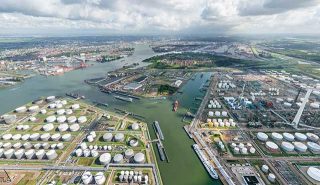Rotterdam Port Ends First Three Quartals with Lower Cargo Volumes

The plunge in dry bulk volumes at the Dutch Port of Rotterdam contributed to the 1.9 percent decrease in the port’s total cargo throughput for the first three quarters of 2016, compared to the same period last year.
From January to September 2016, the port handled 344.7 million tons, against 351.5 million tons in the first nine months of 2015.
The volume of dry bulk handled in the port fell by 7.8 percent, from 65.4 million tons in the first nine months of 2015 to 60.2 million tons in the same period this year. Within the dry bulk segment, iron ore and scrap metal fell by 8.5 percent and coal throughput decreased by 10.3 percent.
Furthermore, throughput in liquid bulk decreased by 0.4 percent, from 169.25 million tons in the first three quarters of 2015 to 168.56 million tons in the same period this year.
The volume of crude oil handled in the port saw a 1.6 percent drop. Nine months into the year, the volume of LNG handled in the Port of Rotterdam was 23.9 percent lower than the level recorded in 2015. According to the port, the decrease in this segment can mainly be attributed to poorer conditions in the re-export market. Other liquid bulk saw a combined increase of 3.6 percent.
Compared to the previous year, throughput of containers decreased by 0.4 percent in TEU. All in all, some 9.26 million TEUs was handled in the port, against 9.3 million TEUs recorded in the first three quarters of 2015.
Although the volumes in the first five months of the year were lower than the ones recorded in 2015, the port was able to record higher volumes from June on. The positive trend is expected to continue into the final quarter mainly due to the sailing schedules adopted by the new shipping alliances and the further development of the terminals at Maasvlakte 2.
Following Hanjin Shipping’s filing for receivership, the suspension of payments by this shipping company led to an estimated loss of 30,000 TEU for the port of Rotterdam, the port said.
In addition, the port said that the impact of Brexit is not yet felt in RoRo volumes including ferries to the UK and the volume in this segment went up by 1.1 percent.
HEADLINES
- Do shipping markets want Biden or Trump for the win?
- All 18 crew safe after fire on Japanese-owned tanker off Singapore
- Singapore launching $44m co-investment initiative for maritime tech start-ups
- Cosco debuts Global Shipping Industry Chain Cooperation Initiative
- US warns of more shipping sanctions
- China continues seaport consolidation as Dalian offer goes unconditional